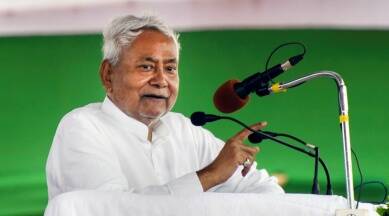With the recent events in Bihar, the topic of whether the Bharatiya Janata Party (BJP) can face a serious threat in the upcoming parliamentary elections in 2024 has arisen once again. Given that no political body can be guaranteed to last forever in a democracy, the issue is very reasonable. The question, however, does call for some kind of analytical evaluation.
The BJP may seem unbeatable. India has a popular leader in Narendra Modi. Its narrative combines Hindutva, hypernationalism, and targeted aid to the needy. Together with the RSS, it has a sizable, dedicated cadre. Opposition divisions help it. Political opponents are intimidated by central investigating agencies. It’s a 24×7 electoral machine with power will.
Politics isn’t static. Powerful, invulnerable people fall. The weak will win. “Har bulandi ke naseebon mein hai pasti ek din,” said Ghalib (Every pinnacle has in its destiny a decline one day”).
What are the BJP’s fault lines, assuming this premise? First, the public is dissatisfied. Under the ‘India Shining’ media boom, regular people are hurting from high prices, unemployment, jobless growth, authoritarian policies, and religious turmoil fuelled by Hindutva’s divisive politics. The poor have become poorer, the middle class – once Modi’s strongest supporter – is decreasing, the economic upheaval from demonetization lingers, and the inept implementation of GST has hurt the economy. While the rich get richer and crony capitalism is alleged, India has dropped in the Global Hunger Index and regular people are locked in an inequitable society. The BJP is so forceful and callous in its pursuit of power that it has few major allies; the Shiv Sena, Akali Dal, and Janata Dal (United) have all left.
Can the opposition channel discontent? It’s now fragmented, with no pan-India organization or cohesion. It lacks a face, narrative, general plan, micro-coordination, and organizational base. The Opposition has strengths. The BJP rules north of the Vindhyas. It obtained two parliamentary majorities in 2014 and 2019 with 31% and 37% of the vote, meaning 60% opposed it. Vote split. In Bihar, West Bengal, Odisha, Andhra Pradesh, Telangana, and Kerala, non-BJP parties hold 150 of 220 seats.
Nitish Kumar’s rise in the Opposition is crucial in this context. Politically, he has switched sides, but the term of opportunism, or kursi prem, needs to be put in context. After a major train accident, he resigned as Atal Bihari Vajpayee’s Railways Minister. In Bihar, he left Lalu in the 1990s when the RJD’s mismanagement and lawlessness became intolerable. In collaboration with the BJP, he joined the Samata Party and beat Lalu. He became Chief Minister and stayed with the BJP, which was less intolerant under Atal Bihari Vajpayee. In 2013, he broke with the BJP over Narendra Modi’s appointment as party leader. His conscientious opposition cost him the 2014 election. He resigned as Chief Minister, admitting responsibility for the fiasco, and returned in 2015 as part of the Maha-Gathbandhan, which defeated Modi’s BJP. His one incomprehensible decision was joining the BJP in 2017, but I know he was uneasy with it from the start.
Nitish Kumar’s expertise and seniority make him an Opposition leader. 17 years as Chief Minister, Cabinet minister, Lok Sabha and state Assembly member. Personal integrity is unquestioned, and he has no dynasty baggage. His home state is in Hindi. His noncombative demeanor might be acceptable to other Opposition leaders without claiming preeminence or opposing them. Despite his 2017 affiliation with the BJP, I know his beliefs are secular and inclusive, with tolerance for all faiths. As a backward class leader, he has the caste census to unite this part of society, not just in Bihar but beyond. The new alliance in Bihar, where seven opposition parties have united, is a model for opposition unity.
His main challenge is to lead the new coalition and focus on governance, which is his competence. Also, he must strengthen his party’s grassroots organization. And he must show he won’t be limited to Bihar, but will reach out to the entire Opposition to form a pan-Indian coalition to oppose the BJP. If he can do this, he may become the person many – including me – thought he always had the credentials to be: the main face of the Opposition to the BJP in the 2024 national election. In the coming months, we’ll see if he’s up to the task.
Read More – Nitish Kumar Resigns as Bihar CM












